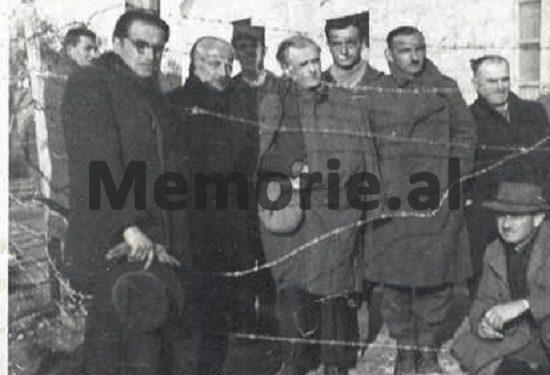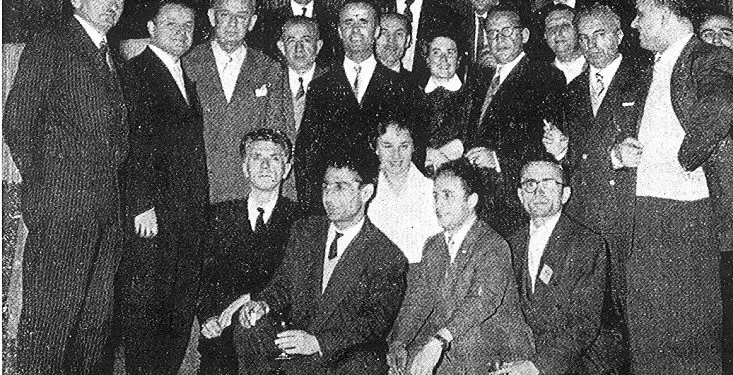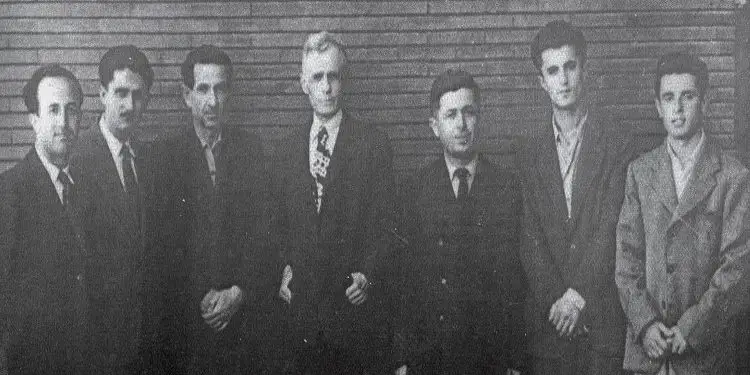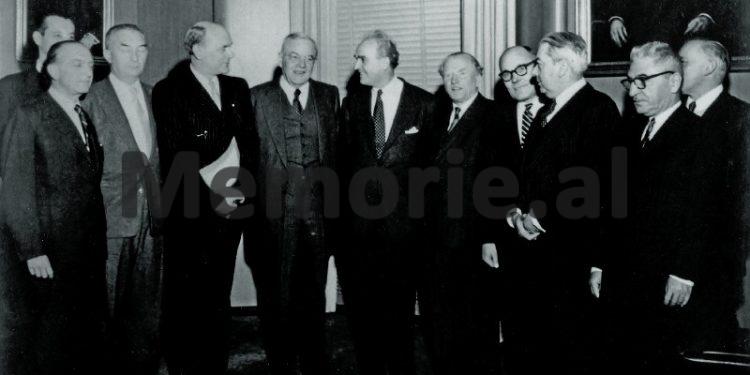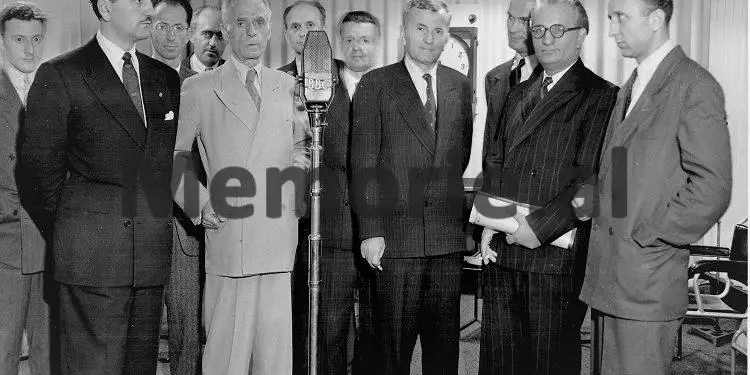By Dalip GRECA
Part One
-Enver Shaska, the nationalist who was imprisoned by fascism and declared a criminal by Enver Hoxha-
Memorie.al / Enver Shaskaj lives in New York. He is a strong man and still does not part with the activities of the Albanian community. He is an active participant in the activities of the Legality Party and in those of the Pan-Albanian Federation “Vatra”. The old nationalist does not forget the painful moment of separation from his homeland. “I wept, I cried,” He says, “when I left my motherland. I remember standing there looking towards my homeland until the mountain peaks disappeared from my sight. I have everything in front of me, as if it happened today,” he says, and begins to browse through his memory: I fled Albania in November 1944, on November 19 I left Shkodra, on November 21 we arrived in Monopoli, Bari, Italy. The journey was difficult, full of surprises. We set off from Tivar. Initially, we were gathered in Shkodra, when the communists’ power had spread throughout Albania. I was the fifth in my family who wanted to conquer the sea. I had an uncle, Sadik Shaska, another uncle, Hakimi, my brother Tajari, his uncle’s son, Hekurani. There was also a cousin who remained in Albania, named Filo Shaskaj. I was 23 at the time years old.
Testimony of Enver Shaska
“I was born on November 22, 1922. We had retreated to the Shkodra highlands, to Sali Mufti’s platoon, where I also met Dr. Fuat Muftina. Until a few moments before departure, we hoped that something would happen. We were all expecting an Allied landing, but we soon learned the truth. Word spread that the Allies would not land and the order came for everyone to look for their own account. I remember Xhemal Najipi, Rrok Geraj, and many others came, as well as Llesh Marashi, Captain Gjelosh Luli.
I had left my uncle in a village, the name of which I do not remember now. Before the gathering in Shkodra, my brother and another uncle were in Kavaja. My uncle’s son and I were there. We immediately gathered in Shkodra. There we received news that a boat was leaving for the Italian coast. I learned that Ali Këlcyra and Kadri Cakrani had been looking for my uncle.
I remember Agim Karagjozi (the current chairman of “Vatra”) telling me this. The reason for the search was that they had left three places on the boat. The uncle said that he would take me and my cousin, Filo. His son, my brother and the other uncle would stay behind. We begged him, we told him that Hekurani is the youngest and the smallest, he could not stay there. We all begged him to take Hekurani. But he was very strange. He replied firmly: ‘I will not do this shame’ to take my son and leave you. I will take you! Do you believe in dreams? – Enver Shaskaj addresses me and asks to remove the recorder of the conversation.
– This uncle’s son had a dream that night, as if he was driving a car and covering every ditch. The car seemed to be from the American army. He told his father in the morning that he would go too. Yes, father’s son, yes, you will get dressed too. But he was holding on to his hopes in vain. This job was over. The three of us were going to run away”, continues Enver Shaska’s story, telling details of the escape without return.
We went to the Cement Factory in Shkodra. My brother tells the uncle’s son, Hekurani, to go too because maybe they saw him as small and took him. When we got down to the Cement Factory in Shkodra, he was not there because the people had been assigned beforehand. My cousin told him to get on his own (when he was destined to suffer) and he returned to his own. It was a very touching moment to part with the land where we were born. All my life I have felt the weight of that land”, and Shaska, moved, remembers the touching moment.
– “My uncle said that we should take some soil from our homeland so that, when he died, we could throw it on his grave, he wanted soil from the land of Albania. I still remember today when I said to him: Come on, we will return in four or five months, more to distract him from the longing, I said those words. But when the tail comes out before the beak! Uncle waits for me: How do you know, you fool. Not me, the old man, I will not return, but neither will you. He was very far-sighted. We left for Tivar. I waited for the boat to Shkodra for these people to come, nothing. Mid’hat Frashëri, Sali Muftiu and many others were going to board that boat.
Later we found out that they had had a mix-up in Shkodër and the boat was not coming. We went to Tivar. There we found the Chetniks, some Montenegrins who had their own boat to take over the sea. We and Hamza Drini, Masar Pustina, Teki Xhindi, Dule Sevrani, Xhevat Kajllajxhiu, were all there. About 39 Albanians. They asked us, the Montenegrin Chetniks: What are you Albanians going to do? We will wait for the boat, we replied. You don’t have time. Tomorrow the communists will take over this place.
Come on our boat. We boarded their boat, after paying a Napoleon. When we boarded the boat, Neshet Kolonja, who was an officer, asked my uncle: Sadik, what do you think? I don’t think we’ll get away with it. The Arab’s face will turn white, he hasn’t done anything! How will they let us go to the English? They will kill us. They will plant a mine on us and throw us into the sea. We were laughing; we had nothing else to do. But it’s better to be eaten by fish than to be caught by communists”.
The confrontation with Marshal Tito’s partisans
“The surprise was saved for the end,” Enver Shaska recalled. When we approached Bari, in Monopoli, we were presented with an unusual sight. At first we didn’t understand anything. What did we see? About ten steamers filled with Tito’s soldiers, with the red star. There were about 40 of us Albanians, more than us were Montenegrin Chetniks. They, the Chetniks, started fighting with the Titos with the red star. Both sides were armed. They started swearing at each other.
Things were getting worse and worse. We were all armed. I remember there was a Montenegrin colonel, Miskuvic, they called him by his name. He was on the boat with his wife. He seemed to be from a chosen family, and this was shown by his and his wife’s appearance, their noble clothing. He called Hamza and Masar Pustina and asked them: What will you Albanians do if they don’t let us, these with the red star, leave?
They immediately replied: War, we are lost in their hands…! No, not so quickly, they replied. Go and talk to each other and give me an answer, because we have decided that we will die fighting. If they turn us back, we know what they will do to us. We will die on this boat, and we will not surrender. Even our own people said, “We will fight and we will not surrender.” An English officer comes with a dog in his hand. The Montenegrins and the Chetniks had an officer who had been a minister to the Germans and spoke perfect English.
He said to the English: – Before we enter into dialogue, I have two words to say to you Englishmen: We have come to you, because you did not come there to help us, but abandoned us. So we came to you. Who will take us in hand? Will you take us, or will these people who have put guns on us take us? If they take us, we have fought with them, there and we will do it here too. But you took us…?!
The English officer calmed us down, saying that they, Tito’s partisans, have nothing to do with you, you have come to us and we will deal with this matter. – No, no, we don’t want this quick answer. Go and ask. He went, turned and said: They have nothing to do with you, but you will hand over your weapons, now you will not need them anymore.
Disarmament and surrender of the revolver…!
This order completely confused us. How could we hand over our weapons, which were our very lives?! This was terrible, this was death. We were all scared because when you have a weapon in your hand, there is no better manhood, but when they take away your weapon, there is nothing worse for a man with withered hands. You are waiting for death and you have nothing to hold on to, you don’t know where it comes from and you don’t know how to face it. One of those who insisted that we give up our weapons was my uncle, Sadiku. Oh, Uncle Sadiku, he had grown up with the war. He had even lost an eye in the war. You couldn’t hear him how calmly he argued the idea of surrendering his weapons.
I remember that we gathered and discussed how we would respond to the request for disarmament. Come on guys. If these people intend to surrender us, even with weapons when we go out there, they will surrender us. Why do you think that we will always carry our weapons with us?! They will take them away from us there. We came here to surrender to them. And you think that these people should kill us, surrender us? But let’s not be the ones to blame. Give us the weapons! That’s what Uncle Sadiku, the former fighter for Independence, the commander of the Vlora War, the King’s deputy for 15 years, told us.
Enver Shaska recalls:
“I had a revolver, a Nagant. I had it from my father and he had it from his father when he got married. How I felt about giving it away. I remembered my father’s bequest. When I went out to the village, he had given it to me as a keepsake and had told me: – Cover it so that it doesn’t get wet, so that it doesn’t rust. Keep your eyes peeled! I felt pain in handing it over at that moment and hid it under my clothes. Another Vlonjat saw me there and said to my uncle: Efendi, Enver has hidden the revolver. Before Uncle Sadiku got angry, he turned to me: Ooo, do you want to tie me up for a revolver. Come here! He took it from me…! That’s how we disarmed.”
Later, Enver Shaska recalls the difficult life in the camps: – “We were unwashed, dirty, because we came from the mountains. The English disinfected us, gave us clothes, and gave us bread. The others came later, sailed by big boat and went through many hardships. Mid’hat Bey, Hasan Dosti, Ali Këlcyra, Sali Muftiu, Selim Damani and others, they took them to Grumo. It was a very bad camp, muddy, very difficult conditions.
My brother, Tajari, and uncle, Hakimi were with them. The mud drowned you. Baba Rexhepi was there, who was a Dervish at the time. They complained about the difficult life: That captain, the English sergeant, would come and pick them up in the middle of the night. You were afraid that you might surrender to Enver Hoxha, because he was an ally of the English, they were victorious, while you were on the side of lost?, – I ask Enver. Ah, if Enver Hoxha had gotten even a little closer to these people, we were afraid they would hand us over. But they did not get close to these people to surrender.
An English general told Ali Këlcyra in Rome, at Mehdi Frashëri’s house: “They had the great fortune that the war with Greece broke out, because we were ready to hand them over, but Enver Hoxha did not bat an eyelid at us”. “Come on, boys; emigrate because there is no war”! Many of the escaped nationalists hoped that one day they would return to where they had come from. They hoped that the power of the communists would fall day by day. But the predictions were predictions. Enver stayed for 50 years and those who fled remained far from their loved ones, far from the homeland for which they had fought, hoping to connect it with the West.
It shows Shaska:
– “We stayed in camps in Italy for five years, waiting with hopes hanging on chance. We had a strong morale and said every day that we would return, not today but tomorrow. When Tito wanted Trieste, we went and said. When the war with Greece broke out, when the war broke out in Korea, in Vietnam, we were always hopeful. But the reality was different. There were two of us in the camp, my uncle and father Rexhepi. They said: “Come on, boys! Emigrate because there is no war. Why will there be war? They took the cow Hise and divided it between them.
Who got the shoulder, which got the thigh? What did Russia lose because there was war? What did America lose? Run away, boys because there is no war”! Then these English and American officials would come and advise us: “Whoever feels weak, should return, and should return because there is no war. Whoever does not want to return, should emigrate. We did not even want to emigrate, because we told them there would be war. This went on for a long time in the camps. Nationalist parties were active in the camps. It was parties like; Balli, Legaliteti, Blloku, that kept our spirits alive.
When Radio Tirana read the list of “criminals”?!
The conversation goes back to the fight against communism, the gathering of nationalists in the camps, their training to throw them in Albania, in the fight to overthrow the power of Enver Hoxha. We went to Company 4000. A total of 90 people left from Italy. When we heard the news that we had been declared enemies of the people! Radio-Tirana gave us the names, as criminals of the people’s power. We had committed crimes, come on, but to make you a criminal without doing anything?
Radio-Tirana said that criminals were sent to Germany by the Anglo-Americans, they want to kill the people, they want to commit crimes, etc. I speak for myself; I have not killed a single bird. When we went to Germany, they took us to some barracks, not bad, not worse, near Dachau. We were trained to be capable, to carry out guerrilla actions. To tell the truth, the ideal kept us alive, but when I remember the difficult conditions, my flesh trembles.
The food was terrible. Then they transferred us from that place and took us to Munich. There was a large warehouse that we guarded, Vekterhof. The unspoken words said that there was an atomic bomb there. Those were warehouses that the Germans had had. We stayed there for 5 years. The first shipments to Albania were made. A group here, a group there. Poor Albanians! Without knowing anything, because we had never been on a plane, let alone knowing how to jump with a parachute. Untrained”.
Enver Shaska has an entire album of photographs that document his 5 years in Germany, in Company 4000. Focusing on each of them, he remembers the friends he lost in the mountains of Albania and others who were taken away by bullets or ropes by the trials of the communist regime. He pauses for a long time in one photograph and seems to get lost for a few moments.
– “Here I am with my friend, Din Lusha”. Shaska shows me and stares at the photo for a long time.
– “He was killed in Albania,” he says. I felt very sorry for him.”
Then he tells the others: “That’s Isuf Dema, that other one, Xhemal Laçi, this is Nuri Risilia, this is Shaban Kruja, that Kalem Sina from the hills of Lushnja, Liman Kurti, they were brave boys, who were not afraid of anything.”
Then he tells about Rexho and Haki Gaba, about Safet Lika, who parachuted in the Kavaja area, together with Shërbet Leçin.
“I have a friend, who I visited a while ago, Muço Hasani, they say. He was with us there in Company 4000. I remember when the officers asked him:
– Have you ever used a parachute?
He laughed and answered the officer in a whisper:
– “I’ve never been on a plane; tell me if you’ve used a parachute! Where would I jump if I hadn’t been on a plane?”
– “But how are you going to do it?”
– “I’ll close my eyes and jump.”
And the poor fellow jumped. And like him, many others. There were those who broke their legs and arms. Some escaped and fought, some were able to get out of the traps they found set up as soon as they landed in Albania, many were even killed; some were captured and tried by the communists. Some were shot, some were hung from ropes. So, all those events. We were waiting. However, when Hamit Matjani was caught in a trap by the Sigurimi, who hung himself from a rope, things changed. The telegraphist, who provided the information, Tahir Prençi, was in my company. He had come from Greece.
We, – says Shaska, – followed the events with anxiety. Much news arrived in the form of echoes or rumors. For example, there were those who thought that Prençi was a communist, but many of us did not believe it. For example, it was said that the slogan they had given us was well-known.
Based on an agreement with the Americans, if we were caught, we had to ask for blankets and officer belts. This request meant that the Sigurimi had caught us. Prençi, as far as we learned, gave this message, but he also asked for Hamit Matjani to be sent. I, – says Shaska, – had heard that Hamit had gone to Athens and met with Nuri Plaka. He had told him:
– Because I smell this job, I have a feeling, but I can’t say no. However, I will go. Yes, in case they tell you to come too, don’t obey the well-known slogan. My slogan and yours is this… and they gave each other a slogan that only the two of them knew. So they took a security measure, according to an agreement between friends, but both of them did not escape, one fell into the trap prepared by the Albanian Security and the Russian KGB, as is known, in between was the chief agent of the Soviets, the English spy, Kim Philby.
– “Don’t go with the slogan that the mission will give you”, – Hamiti had ordered his friend, as they were about to part. Memorie.al
Continued in the next issue




